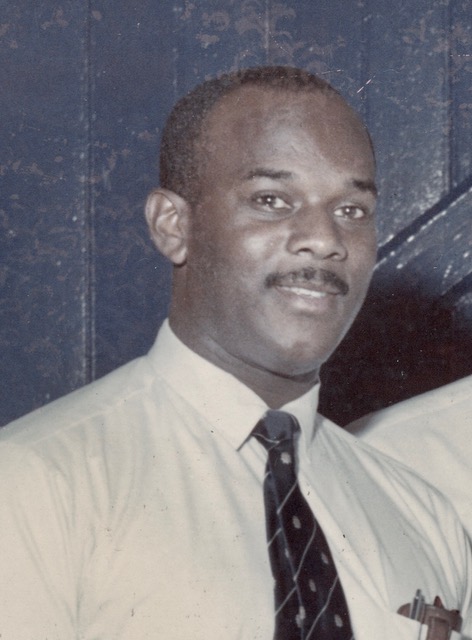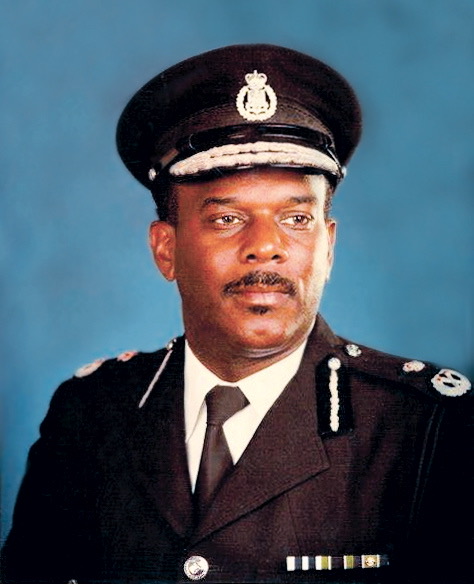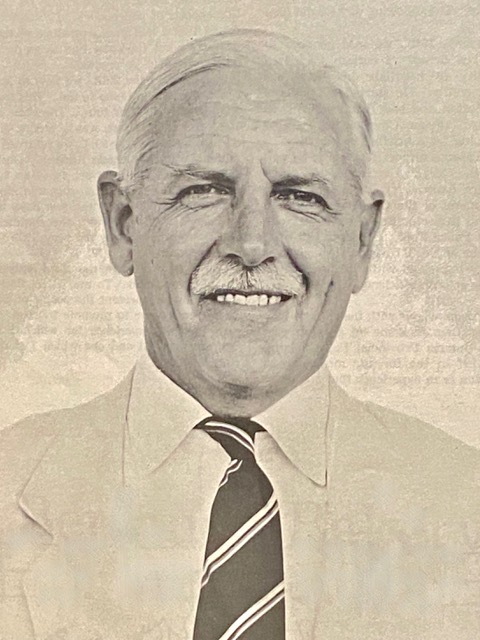George Herbert “Robbie” Robins
MBE, CBE, KPM, OStJ, CPM
1909 – 1959
EARLY HISTORY
George Herbert Robins was born on August 7, 1909 in the small village and parish of Montford, Salop, in the district of Atcham, near Shrewsbury in Shropshire, England, to parents the Rev. Henry Temple Robins and his wife Bertha Mildred Robins.
George had a brother who later became the Rev. Henry Temple Robins, who had been Bishop Cashmore’s curate but who was, in 1960, the rector of Whimple, near Exeter, Devon. This same Rev. Henry’s oldest daughter [Commissioner Robins’ niece] is the godchild of Bishop Cashmore.
George married Lucy Ethel Bedwell in March 1935 in Hendon, Middlesex, England.
Lucy "Lou" was born on November 11, 1910 in Highbury, London, England. She died in 1985 in Attard, Malta.
POLICE CAREER PRIOR TO THE SECOND WORLD WAR
Mr. Robins began his police career in 1930 in Ceylon, as an Assistant Superintendent in charge of Colombo where he remained for 18 years.
1948 Birthday Honours award – MBE
In the 1948 Birthday Honours, George Herbert Robins was awarded the (MBE) by King George VI to reward and highlight good works by citizens of the Commonwealth Realms. These appointments were made to celebrate the official birthday of the King. The honour was published in The London Gazette on 4 June, 1948 and read as follows: "Member of the Order of the British Empire (MBE) George Herbert Robins, Superintendent of Police, Colombo."
Mr. Robins left Ceylon in 1948 and moved to Tanganyika (now Tanzania) as a Senior Superintendent.
Between the years 1950 to 1952 he was director of Colonial Police studies at the Police College, which was then near Coventry and is now in Hampshire, England.
In 1952 he returned to Tanganyika as Assistant Police Commissioner.
1953 Coronation Honours award – KPM
In the 1953 Coronation Honours, George Herbert Robins, MBE, Assistant Commissioner of Police, Tanganyika was awarded the King's Police Medal (KPM) for distinguished police service in the Colonies, Protected States and Trust Territories. These honours were appointments by Queen Elizabeth II to various orders and honours on the occasion of her Coronation on 2nd June 1953. The honour was published in the London Gazette on 1 June 1953.
The recipients of honours are displayed as they were styled before their new honour – George Herbert Robins MBE Assistant Commissioner of Police, Tanganyika.
Mr. Robins was Deputy Commissioner until 1954 when he left Tanganyika and proceeded to Cyprus.
Between 1954 and 1957 Mr. Robins was Commissioner of Police in Cyprus, before becoming acting Police Commissioner in Nigeria until early 1960.
In 1960 he was admitted as a Grade IV Officer of the Order of St. John of Jerusalem.
Having had a distinguished career in the Colonial Police, Mr. Robins was selected by the Secretary of State for the Colonies as Deputy Commissioner of Police in Bermuda to replace Deputy Commissioner, Mr. Maxwell B. Parker who was due to retire on 1st May 1960.
The retirement of Deputy Commissioner Parker, and the appointment Mr. George Robins as Deputy Commissioner of Police in Bermuda was first announced publicly in the following articles published by the Royal Gazette and the Bermuda Recorder on Saturday March 19, 1960 as follows:[
Headline in Royal Gazette
DEPUTY COMMISSIONER PARKER TO RETIRE; SUCCESSOR IS ANNOUNCED
After nearly 25 years' service in the Bermuda Police Force, Mr. M. B. Parker is retiring on May 1. He came here from Barbados, where he was a junior Inspector, in November,1935.
In January,1938 he was promoted to Assistant Superintendent and in July, 1941 he became Deputy Commissioner, a post he holds today. Announcement of Mr. Parker's retirement was made by the Colonial Secretariat yesterday.
Replacing Mr. Parker is Mr. George Herbert Robins, whose first police appointment was as Assistant Superintendent in Ceylon in 1930. Nineteen years later he was transferred to Tanganyika as a Senior Superintendent; he was promoted to Assistant Commissioner in 1951 and Deputy Commissioner in 1953.
Mr. Robins’ next appointment took him to Cyprus, where he remained for three years as Commissioner of Police. In September 1957, he was re-engaged as Deputy Commissioner of Police, Federation of Nigeria, and is currently on leave in the United Kingdom from that post. He is married and has three children.
Headline in Bermuda Recorder
FORMER CYPRUS POLICE CHIEF TO BE DEPUTY HERE
The Secretary of State for the Colonies has selected Mr. George Herbert Robins M.B.E., K.P.M., for appointment to the post of Deputy Commissioner of Police, Bermuda, to replace Mr. M. B. Parker who will be retiring on 1st May 1960.
Mr. Robins’ first police appointment was as an Assistant Superintendent in Ceylon in 1930. He was transferred to Tanganyika as a Senior Superintendent in 1949 and promoted to Assistant Commissioner in 1951 and Deputy Commissioner in 1953. In 1954 he was appointed Commissioner of Police, Cyprus, and served in that territory until he retired in June 1957.
In September, 1957 he was re-engaged as Deputy Commissioner of Police, Federation of Nigeria, and is currently on leave in the United Kingdom from that post.
Mr. Robins is married and has three children. He will be accompanied to Bermuda by Mrs. Robins.
ANNUAL POLICE REPORT - In late April 1960, Commissioner of Police, R.G. Henderson submitted the following Annual Report to the House of Assembly as reported in the Royal Gazette on Monday May 2nd 1960.
Headline in Royal Gazette
COSTLY CHANGES CALLED FOR IN POLICE REPORT
The Police Commissioner’s Report, as reported in The Royal Gazette (RG) on Saturday, had been submitted to the House of Assembly the previous day and is here reproduced in full.
Mr. R. G. Henderson, among other things, asks for Jaguar cars for his road squads, two women policemen, increases in pay for some ranks, increased training courses in the United Kingdom, reinforcements at Hamilton Docks, and a police station in Warwick's "Murder Mile."
The Governor stated in passing the report to the House that he suggested the pay increases be acted on at once, together with the reinforcements for the docks and the Warwick police station.
The Commissioner prefaced his report dated April 18, [1960] by recalling that he was asked on December 4 last year to make a full report on the Police Force and to state:
(a) Whether the present strength and equipment is adequate for normal duties.
(b) Whether the Force is adequately trained and equipped in manpower and material to deal with emergencies.
(c) What reorganization or enlargement is needed to enable the Force adequately to carry out its functions of law enforcement and the maintenance of public order.
Here is the text:
1 – This report deals mainly with the third question from the House of Assembly and gives an explanation as to why I consider the answer to both the first, and to a lesser extent the second, is "no."
A summary, with the estimated cost, is given at the end.
2 – Establishment, General – Present authorized establishment (all ranks) is 211.
Present actual strength (as on 18.4.60) is 179. Vacancies 32.
Apart from local recruitment, which I am anxious to encourage, the shortage of single men's quarters limits the intake of overseas personnel. The Crown Agents are in the process of recruiting 31 men which it is hoped, if there are no further resignations in the near future, will bring the strength up to establishment. (There were 18 resignations last year,)
3 – The Band Block, which is situated to the north of the Prospect Parade Ground, has been earmarked for the Police. This will accommodate 16 single men and the Crown Lands have intimated that this Block will be available for occupation in August, 1960. Sixteen men can be quartered at Admiralty House but should this building be required for any other purpose the Force would be in need of a further 16 rooms. In short there will be just sufficient accommodation for the present authorized establishment when the Band Block is completed and provided that Admiralty House is still available.
URGENT
4 – Housing, The housing question requires urgent attention. It controls the strength situation and, until rectified, an increase in establishment is not possible.
5 – Establishment, If full establishment (211) were reached, I do not think it would be sufficient for the Force to discharge efficiently its normal duties. The increase, which I am recommending, will rectify this situation and at the same time provide the manpower to deal with any foreseeable emergency. My recommendations, in order of urgency and priority, are as follows:
(a) Hamilton Docks .... 18
(b) Staff for proposed New Police Station in Warwick Parish … 7
(c) City of Hamilton. (Includes two Sergeants Central area and one Sergeant i/c Barracks ……. 21
(d) C.I.D. ………….. 6
(e) Motor Traffic Unit ………… 11
TOTAL 63*
*Less one Chief Inspector (post to be abolished) making a total increase of 62.
6 – A schedule of the present and proposed distribution of establishment, including Gazetted Officers, is shown in Appendix 1.
It will be noted that this establishment which I am recommending includes a substantial increase in the number of Sergeants (21 – 39) and three new posts of Assistant Superintendent of Police. This, I am convinced, is a very necessary improvement to provide better prospects of promotion and is a point which Superintendent Lewis particularly stressed with regard to the C.I.D. Promotion to the new posts would be made from within the Force.
7 – In order to accommodate the increased establishment as soon as possible, I recommended that Government rent or purchase suitable buildings in the areas in which the men will work.
8 – DETAILS:
(a) Hamilton Docks.
The security of the docks leaves much to be desired and this fact has caused the Corporation of Hamilton considerable concern. So much so that the Secretary has informed me that the Corporation would be willing to pay the cost for 18 men for dock duties at the rate of £1,200 per annum per man, on the understanding that at times when shipping activity is slack, they would be used to give the City extra Police protection.
(b) Staff for New Police Station in Warwick Parish.
The Parish of Warwick presents a distinct problem. In addition to the attacks on lone females which have caused a feeling of insecurity, this is a heavily built-up area which requires better Police protection than can be provided from Hamilton or Somerset. I am convinced that a Police Station in the vicinity of Cedar Hill with a Sergeant (resident in the Station itself) would have a most salutary effect. Seven men will be required to provide a 24-hour service with a relief for the weekly days off. The C.I.D. were decentralized with effect from the 3rd January, 1960, and it is hoped eventually to use this Station, as their Western Area Headquarters.
(c) City of Hamilton
Recent troubles in the city have proved it is very necessary to patrol in pairs after 5.00 p.m. This is only fair to the man on the beat who is often faced with hostile elements. Incidents frequently occur which require a concentration of men at short notice. There are six beats in the City and I think it most desirable that these are doubled by the addition of 15 men with three reliefs for weekly days off.
(d) C.I.D.
The Chief Superintendent has asked for an additional four detectives in view of the general increase in crime. He also requests that two trained Police Women are recruited from the U.K., to perform C.I.D. duties. He suggests, and I fully agree with him, that one Sergeant and one Constable be obtained in the first instance. These two women, it is hoped, will be able to recruit and train women locally as and when required. It is embarrassing – in fact it is quite wrong – for men to take statements from females in the investigation of sexual offences and other kindred offences affecting women and small children. This recommendation has been endorsed by Detective Superintendent of Scotland Yard.
(e) Motor Traffic Unit.
In 1957, I recommended an increase of 11 men to operate five crime patrol cars. This proposition was not approved. Recently, however, permission was given for the purchase of these vehicles and they have proved themselves to be of great value in combating crime. District constables are at present manning them but since this diverts men from their normal duties, I request an increase of 11.
9 – SALARIES.
An even greater and equally necessary improvement in order to attract and retain men of the right calibre in the Force is an increase in pay. I am greatly concerned with the large number of resignations from the rank of Constable. So serious has this wastage been in recent years, that at the present time there are only six Constables serving who have ten years or more service. It is absolutely essential for an efficient force to have a back-bone of experienced men. It is in my view also highly desirable to have a much greater proportion of local men in the force, but the present pay and conditions of service do not attract Bermudian recruits. I hope that the New Schedule of pay which I am now recommending will do so. My recommendations for a new salary structure for the Police Force are in Appendix II.
10 – ALLOWANCES
Detective Superintendent Lewis has recommended that detectives in the C.I.D. should be paid an allowance, as they are in the U.K. to compensate for the amount of overtime they are often called upon to work. I also recommend that this allowance be paid to Radio and Motor Mechanics in recognition of their specialist skill.
The amount should be at the following rate:
Inspectors ……. £96 per annum
Sergeants ……. £84 per annum
Constables …… £72 per annum
11 – TRAINING.
When submitting the Police Estimates for 1960, the sum of £2,000 was submitted for Police Officers' Instruction Courses. At one time it was thought that the services of a member of Scotland Yard should be sought to give instruction in this country. Mr. Lewis, however, has advised that it would be more practical and beneficial if, instead, the number taking courses overseas should be stepped up. This would be particularly valuable training for locally recruited personnel who do not at present have the benefit of initial training courses in the U.K. I hope, however, that it will be possible to arrange in future for every locally recruited officer to be given the same course of training in the U.K. within his first three years of service as officers recruited in the U.K. I recommend therefore that the police vote for this purpose be increased to a total of £4,500 and used as follows: –
(a) Senior C.I.D. Course (Hendon), two officers.
(b) Junior C.I.D. Course (Hendon), three officers.
(c) Forensic science Course (Bristol), one officer.
(d) Forensic Science Course (Nottingham), one officer.
(e) Standard Metropolitan Police Driving School Course, two officers.
(f) Dog Training Course, Metropolitan Police, three officers.
(g) Individual attachments (Bow Street, London; Finger Print Branch, Scotland Yard; Notting Hill, London; and Brixton, London), four officers.
12 – BUILDINGS AND EQUIPMENT.
I have already recommended that Government acquire suitable buildings to house the increased establishment. Apart from this, the most urgent building requirement is a New Police Station in Warwick. Detective Superintendent Lewis also strongly urges this development. The building should consist of the following:
(1) First Floor — Accommodation for a married Sergeant.
(2) Ground Floor — Small Station with counter, Sergeant's Office, C.I.D. Office, Lock Up, Garage, Rest or refreshment room, Lavatories, etc.
I am endeavoring to find a suitable plot with about ⅓ to ½ an acre of land on or near Middle Road in the vicinity of the junction with Khyber Pass. The Public Works Department have drawn a plan of a suitable building (attached to original copy of this report). I suggest that, until this new Station is built, Government rent a house in the same locality as a temporary measure.
13 – MOTOR CARS.
The force has used the Sunbeam Talbot car for Traffic Patrol work for some years but unfortunately it has gone out of production. When on leave last year in the United Kingdom, I investigated the problem of finding a suitable vehicle to take its place and one which would at the same time conform to local regulations in regard to size. I was unable to find one.
I was advised by all persons, with whom I came in contact during my enquiries that the most suitable car for our purposes would be a Jaguar. This car is slightly larger than our law at present allows (2¾ inches wider and 14¾ inches longer) but in view of its suitability for police work I strongly recommend that legislation be introduced to enable the Police to use Jaguar cars for Patrol work. The T.C.B. have informed me that they would have no objection to the amendment. These cars are used by 39 different Police Forces in the United Kingdom and are very suitable for the housing of wireless equipment.
14 – SUMMARY.
Recommendations.
(a) Single Men's Quarters. Very urgently required. Additional House to be purchased or rented.
(b) Increase in Establishment. Increase from 211 (all ranks) to 273 which includes two Police Women.
(c) Creation of more higher-ranking posts.
(d) Salary Increases.
(e) Training. Instructional courses to be stepped up.
(f) Allowances for detectives and specialists.
(g) Police Station. New police station to be built in Warwick Parish. House to be rented until building completed.
(h) Police Patrol Cars. Regulations to be amended to enable the force to use larger cars than are now permitted.
15 – COST.
The figures given below are approximations, but they are as near as it is possible for me to estimate:
Capital Expenditure
Single Men's Quarters, unknown
Initial Cost of recruiting 42 Constables at £328 each (assuming 20 of 62 required are recruited locally) £13,776
Warwick Police Station £15,000
Police patrol cars. (Funds are available to replace three cars. No further expense is necessary)
TOTAL £28,776
Annual Recruitment Expenditure (New establishment at proposed rates)
216 Constables at £930 (£870 - £1,070) £200,880
39 Sergeants at £1,200 (£1,100 - £1,300 46,800
11 Inspectors at £1,440 (1,350-£1,500) 15,840
3 Assistant Superintendents at £1,550 (£1,550 - £1,700) 4,650
1 Superintendent at £1,800 1,800
1 Chief Superintendent at £1,900 1,900
£271,870
25% bonus 67,968
£339,838
Less
(Present establishment at present rates)
175 Constables at £830 (£750 – £850) ………………… £145,250
21 Sergeants at £930 (£850 – £950) ……………………… 19,530
10 Inspectors at £1,010 (950 – 1,050) ……………………. 10,100
1 Chief Inspector at £1,100 ………………………………… 1,100
1 Superintendent at £1,200 …………………………………...1,200
1 Chief Superintendent at £I,750 1,750
£178,930
25% bonus 44,732
£223,662
= £116,176
Less
Contribution by Corp. of Hamilton, 18 men at £1,200 21,600
£94,576
Plus
Uniforms and equipment for 62 constables ………………. 4,030
Allowances to Detectives and Specialists
(omitting Chief Superintendent) …………………………… 2,448
Additional Training Courses ………………………………… 2,500
TOTAL £103,544
16 – Building up the Force will be a slow process and I do not think the cost to Government will reach the full estimated total until 1964. A jump in local recruitment, which might possibly take place as a result of improvements in conditions of service in regards to both salaries and prospects, would of course reduce the estimated expenditure.
R. G. HENDERSON,
Commissioner of Police.
Appointment of New Deputy Commissioner - The Winter edition of the BPS MAGAZINE at page 38 announced as follows the arrival in the colony of Mr. Gordon (sic) Herbert Robins, MBE to fill the post of Deputy Commissioner of Police.
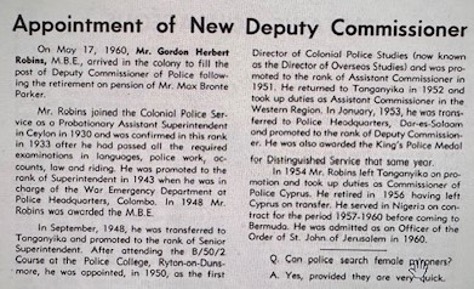
Deputy Commissioner Robins’ wife, Lou, was an excellent artist who quickly became actively involved in the local arts scene, as evidenced by the following article in the Royal Gazette on June 20th 1960.
MARINE ART EXHIBITION REFLECTS MOODS OF SEA
Use a little imagination and you will be able to smell the sea when you go [to] the Art Gallery of the City Hall. Another excellent art exhibition, sponsored by the Bermuda Society of Arts, opened on Saturday and will continue until July 23. The theme is nautical and purposefully coincides with the Bermuda Race, now well under way.
Familiar are the local beach scenes, and especially eye-catching and well executed are those by Helen C. Wayland, Ruth Fountain, Ruth Hooper, Lou Robins, F. Kenwood Giles and Humbert.
The sailing ships of days gone by and local fishing smacks are captured well by Captain Musson, Lou Robins, D. M. Kirkpatrick and John Mitz. Captain Musson has another good "ship" painting which he presumably did in New York against the famous skyline. Lou Robins must also be commended for her beach scene at Lagos Lagoon in Nigeria.
The Royal Gazette reported on Friday June 24th 1960, that the House of Assembly was considering information on housing rented to police officers, along with proposed salary increases:-
HOUSES RENTED BY GOVT. FOR CIVIL SERVANTS
The following information on housing rented by the Government as at June 19 this year [for Police] is now under consideration in the Assembly, along with proposed salary increases for certain senior officers of various departments:
PRIVATE PROPERTIES (All furnished unless otherwise noted)
Police
Allspice, Warwick, G.H. Robins, Deputy Commissioner
CROWN LANDS PROPERTIES (Rented unfurnished – all with Government owned furniture)
Police
Observatory Cottage, Prospect, R.G. Henderson, Commissioner
Depot Lodge, Prospect, J.A. Lodge, Chief Superintendent
Barrack Store Quarters, Prospect, J.M.W. Ham, Constable
1-24 Alexandra Road, Prospect
No. 1 D. Parsons
No. 2 Sgt. Hanlon
No. 3 A. Smith
No. 4 K. Goosey
No. 5 H. Glover
No. 6 W.G. Holmes
No. 7 & 8 Temporarily vacant for redecorating
No. 9 F. Robinson
No. 10 Sgt. Cribben
No. 11 J. Moir
No. 12 P.J. McLoughlin
No. 13 T.D. Adler
No. 14 T. Nichols
No. 15 I.M. Morrison
No. 16 J. Walsh
No. 17 G.D.D. Fletcher
No. 18 P.J.D. Edney
No. 19 J. Lewis
No. 20 J.F. Kane
No. 21 D.G. Selby
No. 22 K.R.J. Morris
No. 23 J.J. Sheehy
No. 24 Sgt. Taylor
1-5 Frog Lane, Prospect
No. 1 W.P. Bryan
No. 2 P.L. Carter
No. 3 J. Sheehan
No. 4 E.A. Burton
No. 5 E.J. Woodward
7- 10 Mary Victoria Road, Prospect
No. 1 Sgt. McMaster
No. 2 D. E. Brashier
No. 3 J. W. R. Curnow
No. 4 A. K. Waddicor
No. 7 Sgt. Doyle
No. 8 J. McNiven
No. 9 R. Railton
No.10 Sgt. Mullan
Bachelor Quarters Police*
Barrack Block No. 1, Prospect
Barrack Block No. 2, Prospect
Police Club, Prospect
St. George's Mess, St. George's
Watford Island Mess, Sandys
*At present occupied by 66 Police Officers.
Maurading Dogs Problem - Deputy Commissioner Robins volunteered as a member of a committee set up to examine problems with marauding dogs throughout the Island as reported in this articdle in the Royal Gazette on August 13th 1960.
TRAPS SEEN AS BEST SOLUTION TO PROBLEM OF MARAUDING DOGS
Holding the rank of Deputy Commissioner of Police, Mr. Robins is reported as being a voluntary committee member set up to examine the problem of marauding dogs around the Island.
Trapping was thought to be the answer but the question of who was to set the traps was considered by the committee chairman Lt.-Col. Astwood who said he thought the solution to this would be to have the police set them out when complaints were received concerning dogs on the prowl.
He said the help of the Society for the Prevention of Cruelty to Animals would be enlisted to open the traps and take care of the animals apprehended in that manner. In this way the animals would be well treated, especially innocent dogs who happened to wander into the traps. The committee were to meet again shortly to finalize their plans.
EDITORS NOTE - Our next article will cover the year 1961.
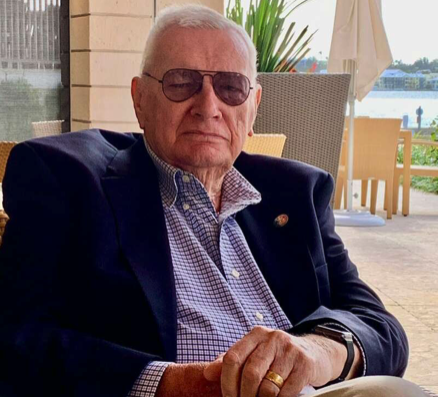 Capt John W. Moore, CPM, CMN (ret)
Capt John W. Moore, CPM, CMN (ret)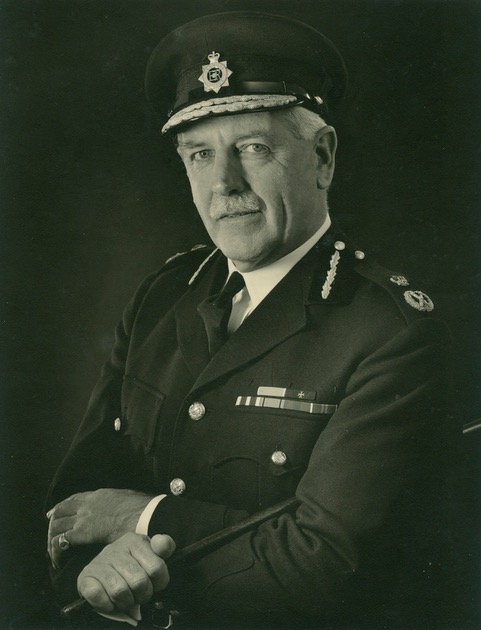
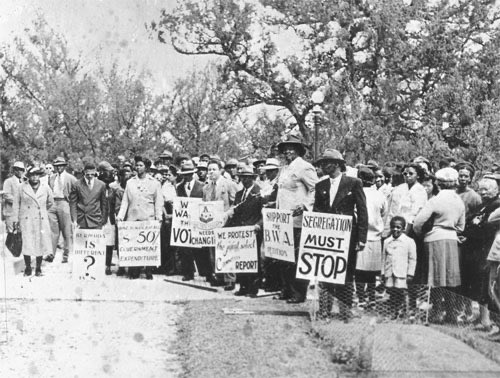
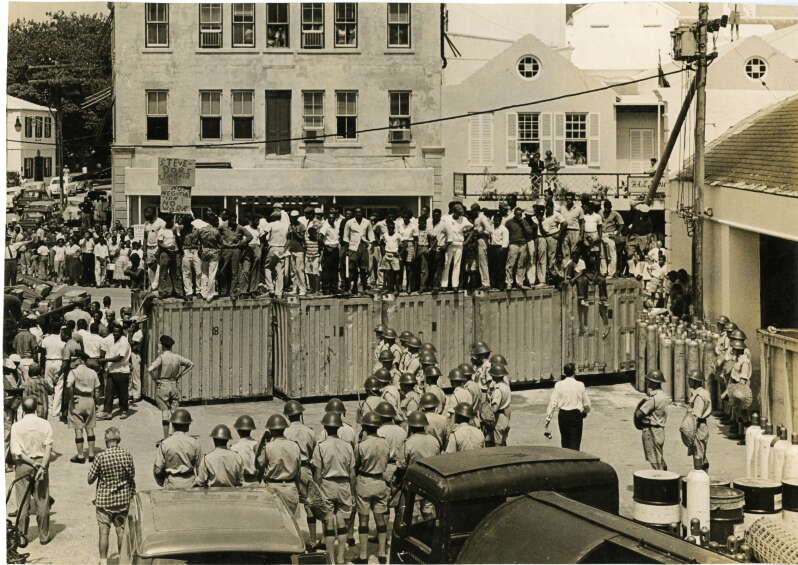 Dock Strike - September 1959
Dock Strike - September 1959